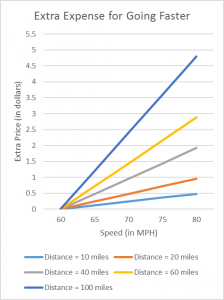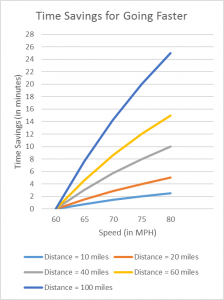Have you ever been on the freeway, going 10 miles over the speed limit and laughing at all those suckers biting your dust? Well, I got news for you. They’re laughing right back, because your tank is emptying much faster than theirs.
Let’s be honest, 10 above the speed limit is the real speed limit, so you don’t have to perform a benefit-cost analysis of whether speeding down I-5 at 70 is worth the risk of a ticket. Instead, you should be wondering whether the time saved going 70 instead of 60 (or dare I say 55) is worth the cost of the decreased fuel economy.
That’s right, somewhere around 55 miles, virtually all cars see a decline in fuel economy. Every 5 miles above 60, you’re paying roughly an additional $0.30 more per gallon. I then went ahead and calculated how much it costs you to go 60, 65, 70, 75, and 80 mph. I used various trip lengths just to show how driving fast adds up.
That doesn’t seem so bad, right? It only costs $.50 overall on a 10-mile trip to go 80 mph instead of 60.That seems worth it. And sure, nearly $5 to go 80 instead of 60 sounds like a lot but it’s a 100 mile trip so there’s got to be some serious time savings, right? That’s the trade-off, really, less time wasted driving (more leisure time) for some cash. So I then calculated the time savings.
Remember, you can be going 60 without any costly consequences, so this is the time savings for going faster than that. This shows that a person with a 10-mile distance can get there 2 1/2 minutes faster if they go 80 rather than 60 (at the cost of about $.5). It also shows that a person will get there 25 minutes faster if they go 80 rather than 60 on a 100-mile journey (at the cost of about $5).
If going faster on the 100-mile journey sounds more worth it than the 10-mile journey (or vice versa) than you’re experiencing some behavioral anomalies, because those ratios are exactly the same (almost $.20 for every minute saved). It’s like paying someone $12 an hour to go 80 mph instead of 60. Now does it sound worth it? See, phrasing makes a difference.
Let’s not forget that a host of other variables will also be affecting mpg, and thus costing you more or less money. The most significant other factor is how well and often you accelerate. Constantly accelerating and decelerating can cut your mileage by as much as 33%. Accelerating gradually and less often (meaning breaking sooner and slower) uses a lot less gas and is the number one practice to save you money.
Wind resistance is a problem, and rolling up windows and taking off roof cargo can increase your fuel economy by 10-25% on the freeway. Also taking out weight helps, especially with smaller cars where proportionally it’s a bigger difference. On average removing 100 pounds increases mpg by 1%, which clearly adds up.
Other ways to save on fuel expenses is not to idle, which can use a quarter of a gallon per hour. If you’re going to stop for over 10 seconds, it’s entirely worth it to turn off the car because restarting uses approximately 10 seconds of fuel. Finally, and most surprisingly, don’t use the AC so often. It runs on your car’s gas, and reducing usage can save up to 10-15% on fuel.
Let’s take these tips to the road.



Great post here. Of course, in presenting only the direct fuel cost relative to the opportunity cost of time, you are overlooking something potentially far more costly. To the degree that there’s a positive correlation between speed and risk of a costly or fatal accident, this expected cost should be factored in (but often is ignored by drivers). In fact, a willingness to take on the increased risk of speed, given the net benefits implied above, allows you theoretically to place an upper bound on the value you place on your life (assuming you are making the speeding decision rationally) as evaluated by your perceived relative increase in probability of a fatal accident.
Thanks for mentioning it! At some point during my writing I saw mention of this, but promptly forgot to include it. It just further shows how nonsensical driving fast is to the entirely rational, perfectly-informed being that none of us are.